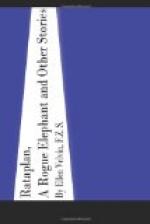His favorite food happened to be buffalo and giraffe, and although they were both extremely troublesome things to get hold of, Leo cared not. He liked buffalo and giraffe, and he intended to have them. The other lions would never go out of their way if they could get an antelope or a jaguar, because they were easy to strike down and were very good eating; but to obtain a buffalo or a giraffe meant running long distances, and this is what a lion does not care to do.
With his great strength he can give tremendous springs, but, owing to his indolent nature, he dislikes a long-continued race, which is apt, before it is finished, to be somewhat tiring, even to a lion.
Buffaloes and giraffes are made for running and think nothing of it, but the lion is built in a different manner, and, moreover, he knows that these animals are so wonderfully quick of hearing that they generally obtain a good start to begin with.
But Leo cared nothing for this: if he wanted a buffalo he had it, even if he raced half the night through for it. As a matter of fact, the longer the race the more he enjoyed the feast. What could be nicer than, after racing for miles after a nice, fat buffalo, to pull it down with his strong paws, to tear open its throat, and drink the warm blood?
Sometimes he ate a part of the flesh, but not always; he was somewhat fastidious, and so that he had the warm blood, he more often than not left the carcass for the wolves and hyenas, or any other animal who cared to have it.
There was perhaps even more delight in obtaining a giraffe than a buffalo. For a giraffe can skim over the ground at an amazing pace—so swiftly, so silently, that not a sound can be heard except the soft, gentle swish of its funny little tail.
The stately carriage of the giraffe does not appeal to the lion, and the graceful neck, with its pretty head and round, gentle eyes, has no effect on him; all he thinks of is the tender flesh and delicate flavor which belong peculiarly to a giraffe.
There is no struggle as with the buffalo when the lion springs upon the giraffe. There is no roar or noise of any kind, for the giraffe is absolutely dumb, and makes no sound even when dying.
But Leo was fastidious even about the giraffe: he only ate the parts he liked best, and left the rest for the lower animals.
At other times, when the indolence of his nature overcame him, Leo would content himself with a young antelope or any other animal which was easy to capture. When food was scarce he would use the lion’s tactics to get it.
In the first place, he would be very careful to go against the wind, so that the peculiar odor, which all animals that belong to the cat tribe have, should be blown behind him, and so not convey any warning to the animals he was approaching. If he failed to find anything, he would resort to tactic number two. He would put his huge mouth close to the ground and roar, moving his head in a half-circle all the time; by doing this it was impossible for the animals to tell from which direction the sound came, and, wild with terror, the foolish creatures would rush out in all directions, very often into Leo’s very mouth.




